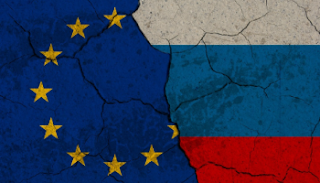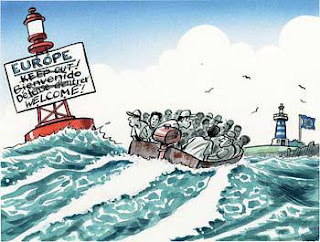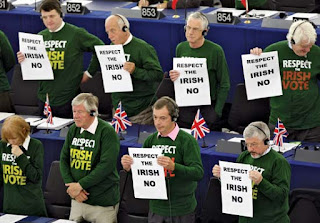For the first five years of the euro-zone economic crisis, the attention of the media and European public was focused on Greece. Every development, strike, protest, fault or scandal was reported by most major media organizations in the continent.
So much that people almost forget that this crisis was not confined in Greece only. It has affected most countries in Europe, especially those in the eurozone. Yet while we have had a detailed portrayal or all events in Greece, we rarely had any information on how other countries are responding to austerity.
In 2015, Ireland has seen an unprecedented amount of its citizens, joining anti-austerity protests. What triggered the demonstrations was the introduction of water charges, which are part of the austerity policies that Ireland had to adopt, under its bailout plan.
Various anti-austerity, Left-wing platforms or community groups, have joined and initiated the protests, which started about a year ago. They were all driven by an “austerity fatigue”, plus a growing feeling of injustice, where people were called to bail-out financial institutions.
The protests came to the fore of public attention, with a protest of around 100,000 people in Dublin on 11 October last year. People across the country were involved, from all backgrounds. The latest one took place on August the 29th, in which some 80,000 people participated.
For someone that does not live in Ireland, a protest against water charges may seem odd. Every nation in Europe has already introduced water bills decades ago. In addition, Irish people will enjoy the cheapest charges in Europe for water. So why do they protest?
The water charges debate is not anything new in the country. It has been going on for decades and in fact in the past, water charges were introduced and then abolished by previous governments.
The situation was always a complex one, with local authorities and the elected government of each given period engaging in negotiations, leading to various agreements.
From introducing council service charges or “double taxation” as some named them, to payments through local government funds, governments tried to come up with solutions.
One Irish political figure, who is extremely vocal on the issue, is Paul Murphy. The former Member of the European Parliament is now a TD for the Anti-Austerity Alliance in the Dail (Irish Parliament).
Paul explains that there has never been a separate charge for water in Ireland; it has been paid through general central taxation. He believes that its use should be remitted through progressive taxation like income, wealth and corporation tax, rather than regressive indirect taxes like water charges.
“Charges like these will penalize those who have the least the most, whereas those who have the most would barely feel the charge,” he says.
“The Irish public is also opposed to the charges, because they think they are a precursor to making water a commodity and then privatizing their water infrastructure,” Paul describes.
He adds that people are involved heavily in the protests, because they have had seven years of vicious austerity. Which amounted to €31 billion of extra cuts and taxes, thus the timing of the introduction of the charges is bad.
“The government announced a recovery that few experience, plus they wanted to continue with austerity in the form of these water charges. The accumulated anger over the course of the crisis, exploded on this issue,” Paul notes.
The protests have been enormously successful so far, being the biggest social movement in decades. They forced the government to make significant concessions, delaying the charge and reducing it significantly, trying to convince people to pay it.
“Most importantly, the movement has succeeded in having 57% of people refuse to pay the water charges, despite months of propaganda and scaremongering,” explains Paul.
Left-wing groups, including the Anti-Austerity Alliance are heavily involved, but it has also created a whole new activist layer in a society of thousands of people.
“The political elite are scared of the anti-water charges movement. They thought they had gotten through the crisis without major social movements and political radicalization. Now they face both on this issue.” Paul describes.
“Their response has been an unprecedented level of state repression. People are arrested daily for protesting against water meters,” he notes.
The largest demonstrations have seen up to 200,000 protesters joining in a series of regional initiatives. Over 50% of them according to surveys have never been involved in protests before.
Although there are not active links with other movements across Europe, there is a widespread sentiment of solidarity with other working people across Europe. For example, during the anti-water charges protests, many of the protesters were holding Greek flags.
“In Ireland just as in Greece and Spain, the traditional establishment parties have been significantly undermined. There is a rise in support for left-wing and socialist parties like the Anti-Austerity Alliance,” says Paul.
But why Ireland has escaped the focus of the European media, regarding such protests? “The defeat of the Syriza government, under the pressure of incredible and undemocratic bullying by the EU, is used by the Right in Ireland to undermine the Left” he explains.
“There is a big lie surrounding Ireland; that it is the success story of austerity and that people accepted it. The Irish government and the European authorities are complicit in this, each for their own purpose,” Paul describes.
“For the Irish government, it means a pat on the back by the EU Commission. For the EU authorities, it provides a stick to beat the people of Greece with, showing that supposedly austerity works,” he adds.
“The movement around water charges explodes that lie and doesn’t fit with the narrative that is shared by the establishments across Europe. That is why what is happening in Ireland, is not largely reported,” Paul concludes.
Ireland had a general election within the next eight months after the protests and with widespread non-payment, the water charges were a key issue which heavily influenced the outcome. There was be immense pressure on the next government, to abolish water charges and Irish Water.
This article was written originally by me in 2015 and was exclusively published for OneEurope. Now I have decided to include it and republish it on my own blog.











